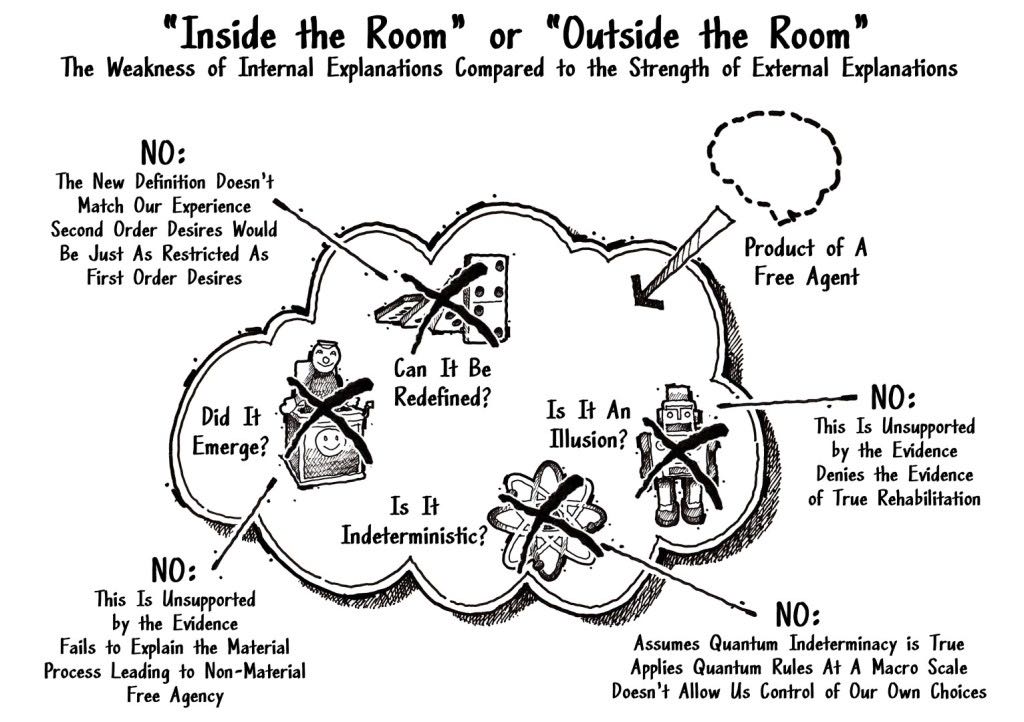

Illustration from God’s Crime Scene
In an effort to explain free will while staying “inside the room” of a purely physical, material universe, some philosophers have pointed to the research of quantum physicists. What if the foundational physical laws of the universe are not as deterministic as we once believed? At atomic and sub-atomic scales (quantum levels), particles do not behave in entirely predictable ways (as do larger material objects). Many physicists (like Werner Heisenberg and Niels Bohr) have argued these quantum particles are without set pathways and may not be causally connected like objects at larger scales.
They also believe laws of quantum mechanics may be foundational to the universe. If this is true, at least some physical events aren’t deterministically caused by prior events; at the quantum level, the universe may not be deterministic at all, but may instead be indeterministic. According to this view, there may, therefore, be room for the physical freedom needed in our brains to break the cause and effect Determinism I’ve already described.
But while the possibility of indeterminate, foundational laws of quantum physics guiding the universe may seem to provide naturalists with an explanation from “inside the room”, this explanation also has critical liabilities:
This Explanation Relies on Certainty about Quantum Indeterminacy
While quantum mechanics is still our best theory related to the subatomic world, we don’t know if there’s actually another layer of reality beneath the quantum layer. Many scientists and philosophers believe there are still hidden, unknown variables operating at the quantum scale; if we had this additional information, they believe, the somewhat perplexing nature of the quantum world might turn out to be causally predictable just like larger scale objects. There are presently a wide variety of quantum physics models, many of which contradict each other. We may eventually find the laws of physics are every bit as deterministic at the quantum scale as they are at larger scales.
This Explanation Applies Quantum Mechanics at a Larger Scale
Many philosophers question whether the laws of quantum physics can be rightfully applied to what’s happening in our brains in the first place. Although sub-atomic particles may respond in an indeterminate way at the micro-level, this does not mean our brains are acting in an indeterminate way at the macro-level. The neurons in our brains are composed of many molecules (and even more atoms). Why should we believe the laws of quantum mechanics would also apply to brain activity?
This Explanation Still Doesn’t Give Us Any Control
Even if our brain activity involved indeterminate quantum level activity, this still wouldn’t provide us with the free will we experience on a daily basis. If the events in our brain are indeterminate and random, how could we ever trust our thoughts as our own? How could we be in control of our actions if the thoughts guiding these actions are indeterminate? Quantum indeterminacy doesn’t help us to understand our thoughts, choices or actions. If our thoughts and choices are truly independent of any cause, “every thought and action would seem to merit the statement, ‘I don’t know what came over me.’” Philosopher Robert Kane is correct, therefore, when he observes, “If free will is not compatible with Determinism, it does not seem to be compatible with indeterminism either.”
Efforts to stay “inside the room” of the natural universe for an explanation of free agency by employing quantum physics fail to provide us with an adequate explanation for the freedom we all experience as conscious, thinking humans. If the explanation for free will isn’t found “inside the room”, maybe it’s time to look outside. For a more lengthy explanation of the role free agency plays in the case for God’s existence, please refer to God’s Crime Scene, Chapter Six – Free Will or Full Wiring: Are Real Choices Even Possible?

J. Warner Wallace is a Dateline featured Cold-Case Detective, Senior Fellow at the Colson Center for Christian Worldview, Adj. Professor of Christian Apologetics at Talbot School of Theology, Biola University, author of Cold-Case Christianity, God’s Crime Scene, and Forensic Faith, and creator of the Case Makers Academy for kids.
Subscribe to J. Warner’s Daily Email
J. Warner Wallace is a Dateline featured cold-case homicide detective, popular national speaker and best-selling author. He continues to consult on cold-case investigations while serving as a Senior Fellow at the Colson Center for Christian Worldview. He is also an Adj. Professor of Christian Apologetics at Talbot School of Theology, Biola University, and a faculty member at Summit Ministries. He holds a BA in Design (from CSULB), an MA in Architecture (from UCLA), and an MA in Theological Studies (from Gateway Seminary).

































